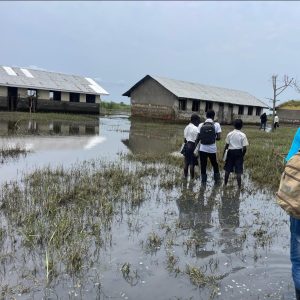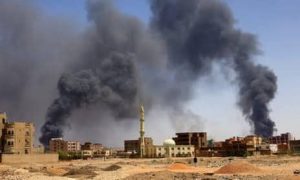
#OutToLunch: Irrigation, desilting could solve Ntoroko and Kasese flooding
#OutToLunch: Irrigation, desilting could solve Ntoroko and Kasese flooding By Denis Jjuuko Some parts of Uganda have started experiencing harsh weather events. Flooding is one of them. In the last few weeks, rivers Nyamwamba in Kasese and Semiliki in Ntoroko have burst their banks leading to flooding. The latest incident in Ntoroko displaced more than 24,000 people, submerged 11 schools thereby affecting more than 4,000 learners. Ntoroko leaders say that this is the worst flooding in more than 50 years. The flooding took place in late August after torrential rains in the nearby Democratic Republic of Congo. The rains in Ntoroko are expected between September and November and the place is already flooded! What will happen when the Ntoroko rains start falling? More people will be displaced. Ntoroko is such a low-lying area surrounded by the Rwenzori Mountain ranges, River Semiliki and Lake Albert. Rains in the DRC lead to rising water levels in Lake Albert and River Semiliki hence flooding that not only destroys people’s houses but also entire livelihoods. The people of Ntoroko have three major economic activities — farming, fishing and cattle keeping. The floods affect all those activities. Food gardens and pastures get submerged while roads are cut off. The people then start relying on donated food to survive while living in internally displaced people’s camps. The flooding in Ntoroko is not out of the blue. Given its terrain, flooding is always expected and has intensified since 2019. Nyamwamba in Kasese has been causing havoc for a long time. Some people who claim to know these things say that both Semiliki and Nyamwamba are so silted that the only result is flooding. Although I was in Ntoroko a week ago, I didn’t manage to visit Semiliki but for Nyamwamba, they have a point. Nyamwamba carries big boulders from the mountains into its path. Previously, after it had rained, tractors would remove these boulders so that whenever it rained again in the mountains, there would be space for water and other boulders. Probably this explains why facilities such as Kilembe hospital and residences were built so close to River Nyamwamba. The river was never a threat. People knew what to do. When I was in Kilembe last year, many boulders were not being removed from the river’s path. Given the neglect, Nyamwamba had to find its way. The end result is people losing their lives and properties. Some people will blame it on climate change. The real reason is that we forgot the basics — something as mundane as having a tractor removing the boulders from the river’s path! Most of the disasters affecting our people can be solved. In Ntoroko, flooding is always followed by a prolonged severe drought from December until the next rains around March. The price of a cow during this period falls by 90% if a farmer is lucky to find a buyer. The main reason is because of lack of water and pasture. In a place that was flooding a month or so before. With schools submerged, children are likely to abandon their education and resort to other activities like fishing immature fish. The girls will be married off before they even experience their first menstrual cycle. I heard that those who aren’t being married off are instead being booked by parents and guardians eager to earn a small fee that wouldn’t even enable them to buy a scraggy cow. How difficult is it to dig up valley dams? How difficult is it to create an irrigation scheme so that livelihoods are not lost during the dry season? This would also ensure that kids are kept in school instead of fishing in dangerously rising waters or becoming mothers and wives before age. Money spent on infrastructure like roads, schools and health facilities is always lost due to flooding. Yet there are sustainable measures that the government can put in place to solve these challenges. Some of these measures can be implemented by the communities themselves. Others through entrepreneurship. People who own thousands of heads of cattle need technical advice to find sustainable solutions. And we can also learn from Egypt, a desert that supplies our markets with fruits that we have failed to grow. If you buy oranges from supermarkets, they are probably imported from Egypt that gets its water from the Nile for irrigation. They built the delta barrage that has saved them from flooding while using that water for irrigating their crops. And the delta barrage was constructed nearly 200 years ago. In the 21st century, we should be solving some of these challenges. The writer is a communication and visibility consultant. djjuuko@gmail.com

